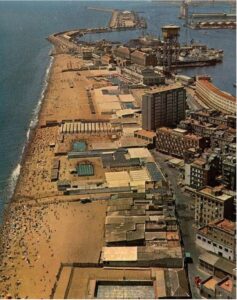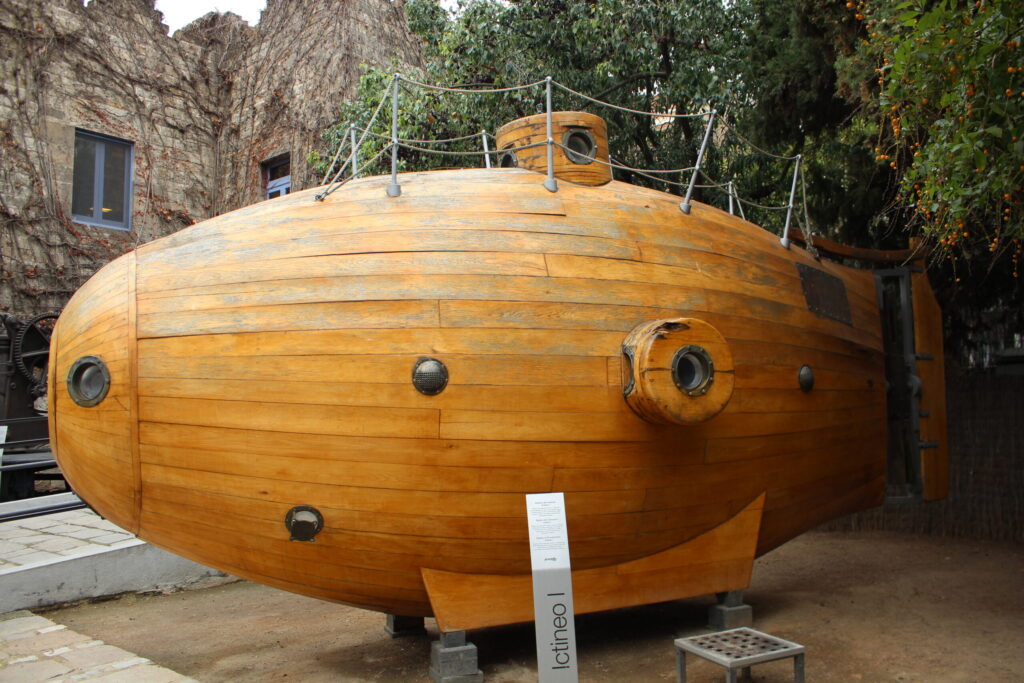Ocean expert
At school, we were told that 70% of the Earth’s surface was ocean. On Wikipedia, you can discover that this 70% is roughly 361,132,999 km², equivalent to a volume of 1,332,000,000 km² of liquid. Now, Josep Lluís Pelegrí makes it very clear that, behind these impressive figures, we owe our lives to the oceans. Just as it sounds.
Oceans or ocean?
I myself couldn’t say how many oceans or seas there are. The reality is that they’re all interconnected, and these divisions are extremely arbitrary. I like to say “Ocean.” In fact, I think of it as the circulatory system of a living organism. I’m referring to the planetary organism of which all living beings are a part.
Powerful statement.
Water is the basis of all life, and practically all water is found in the oceans. We are the ocean at our core. This is a message that connects us with nature and, at the same time, connects us with each other, as human beings.
Water is “just” H₂O .
Water is the physical medium, but this physical medium contains so much life that it makes it a highly complex organism. Ninety-five percent of the Earth’s metabolic activity is in the oceans. That’s the big fact.
Our climate is determined by the ocean.
The oceans are the Earth’s climate regulator. They are the planet’s largest heat regulator. They absorb 90% of the excess temperature caused by climate change. They also act as a very efficient carbon sink, absorbing more than 30% of human-generated CO₂ emissions .
You could say we owe them our lives.
Without them, there would be no life. In addition to regulating the climate, they produce 50% of the oxygen we breathe.
This is the climate we are altering.
Humans are disrupting this self-regulation by introducing an external element like greenhouse gases, produced by fossil fuels. Part of the radiation emitted by the Earth is trapped by the atmosphere and returns to Earth, warming it. The increase in greenhouse gases means that this return is becoming greater and greater, because if the oceans make up 70% of the Earth’s surface, 70% of this rebounded radiation will end up in the sea.
Fortunately, the ocean absorbs most of this excess temperature. I say fortunately because the ocean, with its average depth of approximately 3,700 m, is warming only 0.5°C. It has only warmed 0.1°C. °C since the industrial era. The surface of the oceans has warmed more, by 1.0 °C, but much less than the surface of land areas, 2.0 °C.
Let’s not be complacent.
Of course, we must reduce this greenhouse effect we cause, because its effects are all negative. The average global warming is 1.3 °C since pre-industrial times, and it hasn’t stopped. The areas that have warmed the most are the high latitudes. Europe, for example, has warmed by 2.5 °C.
But sea levels are rising.
Between 3 and 4 mm per year. There are two causes: polar ice melting and this warming, which causes the water to expand further.
In 2024, Barcelona hosted the UNESCO World Ocean Decade Conference. What is it about?
At the end of the 20th century, the United Nations began promoting the idea of sustainable development. They realized that it is not possible to separate social issues from nature. If you want a dignified social life, without inequalities and poverty, you have to have a respected nature that is in harmony with people. Thus, in 2009, the United Nations launched a declaration of harmony with nature ( Harmony with Nature) and in 2015, they promulgated sustainable development, with a set of goals and tools to achieve them. The results will be thoroughly tested in 2030.
Good intentions. Satisfactory results?
We’re working toward that goal. After the decade of poverty, the decade of water, of nature, we are now in the decade of the oceans. Specifically, the decade of ocean science for sustainable development. A very powerful concept in which many of us work and are committed..
Science doesn’t always evolve in favor of humanity.
Science is precious. Doing science is exciting. Science allows us to achieve goals that advance our evolution, but the most important thing is that this science helps us achieve sustainable development for society. Science with a positive social impact for everyone, without exception.
Barceloneta beach has crystal-clear water. Who has seen it and who sees it?
A lot of work has been done to achieve the water quality it currently enjoys. The administration has done an excellent job in this regard. Our beaches, in general, are in good health.
Well, now that summer is here, we’re happy to hear this statement from an expert.
THE OCEAN COMBINES QUITE WELL WITH MUSIC AND READING
Oceanographer, scholar of ocean circulation, marine ecosystems and climate change, with a holistic planetary vision. He worked eight years in industry and eleven as a university professor, and since 2003 he has been a CSIC researcher at the Institute of Marine Sciences of Barcelona. Dean of Marine Sciences at the University of Las Palmas (1998-2002), Spanish coordinator of Earth Sciences (2006-2010), director of the Institute of Marine Sciences (2018-2022) and coordinator of the UNESCO Ocean Cities program (2021-2023). He has coordinated numerous research projects and training activities, supervised 21 doctoral theses, published more than 150 scientific articles and around 50 essays, and edited 7 books.
A rich resume. Can you explain it to us?
I’m a physicist by profession, with two master’s degrees in oceanography and physical oceanography, and a PhD in oceanography. I started studying physics because I thought it would help me to better understand the world I was in. And in a way, to understand the world better is to understand yourself better. In fact, I hesitated between studying physics or philosophy. I was also tempted to study forestry, because of my passion for nature.
The ocean wasn’t found in a physics lab.
Sometimes some aspects of physics studies seemed a bit abstract and theoretical to me. Perhaps because of my youthful restlessness, I wanted something closer to me, something I could perceive and see. As I always liked the sea, I decided to study it. In those days there were no oceanography or marine science studies. I was born in Venezuela, coinciding with one of my father’s many work assignments. I returned when I was young and studied physics at the Simón Bolívar University. Like him, I also travelled a lot before settling here.
Combining the sea with your other passions: reading and music.
I love reading, especially novels and philosophy books that deal with the human side and emotions. I’m also passionate about music. I play the classical guitar to the best of my ability and sing in a choir. As individuals, we are distressed by loneliness, and in the choir, I reclaim this group connection in a harmonious, almost magical way.










